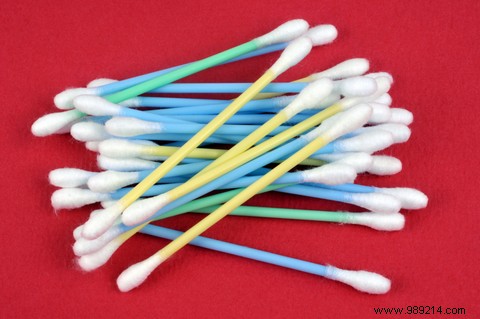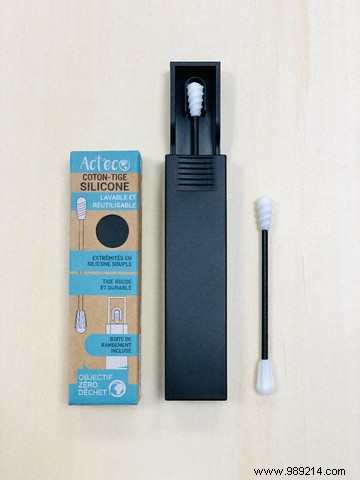In recent years, many alternatives to cotton swabs classics are flourishing on the cosmetics market. For fans of zero waste who want their ears to be perfectly clean, the oriculi is the ideal accessory . Why use it and what are its advantages? Discover all the secrets of the earpick , to take care of your ear canals while preserving the planet.

Plastic cotton swabs , products resulting from the development of the petrochemical industry in the 1970s, have been banned for sale since January 1, 2020. Cardboard, bamboo or compressed paper, biodegradable materials now replace plastic rods . The cotton swab nevertheless remains a single-use product, intended to be thrown away as soon as it is used for the first time. If the plastic is gone, these disposable products one day or another are likely to end up in the oceans. A disaster for biodiversity, directly impacted by this marine litter.
If disposable cotton swabs are now made of biodegradable materials , they are nonetheless polluting products. Most of the time, they are packaged in plastic packaging which are not always recyclable. The pallets which make it easier to transport them are often protected by single-use plastic film. Finally, the fuel used to transport the goods from the manufacturer to the consumer is also to be taken into account. Finally, the cotton swab, even without plastic, has a significant ecological impact .
Cotton used to make the head of cotton swabs is often grown in environmentally unfriendly conditions . Indeed, it is a plant that thrives in relatively warm climates and requires large amounts of water. Cotton is used in the composition of many products whose demand continues to increase. To meet this need, farmers stimulate the growth of cotton through the use of chemical fertilizers. They are also likely to use pesticides and herbicides to protect their crops. Ultimately, groundwater is polluted and threatened ecosystems.
The oriculi is the ideal alternative to the cotton swab. Because it is reusable, it reduces the production of plastic products on a daily basis. It is the essential accessory for people who wish to reduce their environmental impact or who are committed to a zero waste approach. . It's a small gesture that allows, among other things, to reduce pollution of the oceans.
The ear pick can be reused endlessly. In addition to its efficiency, it reduces consumption daily disposable products. It is a durable alternative to the cotton swab that will accompany you for many years. Its price varies between 4 and 6 euros, depending on the material that composes it. It is a reasonable and sustainable investment which saves money in the long run.
Practical and compact, the oriculi slips easily into a toiletry bag. Unlike the pack of cotton swabs, it takes up very little space. It is the essential partner for travelers or people who move regularly. On vacation, at the gym or at work, it accompanies you on all your adventures!
Improper use of conventional cotton swabs may cause clogs to form. Indeed, they push the earwax into the duct which then tends to accumulate at the bottom of the ear. Oriculi limits the formation of clogs , because it detaches the cerumen from its wall. Then, the curved shape of its stem allows residues to be easily evacuated.
The Oriculi is positioned as one of the best alternatives to the cotton swab. Washable and effective, it gently cleans the inside of the ear. Used once or twice a week , it removes earwax located at the entrance to the ear canal. It is important to remember that earwax protects the eardrum from external aggressions. The objective is simply to remove the excess to prevent it from being too visible.
To handle the earpick perfectly and thoroughly clean your ear canals, we advise you to follow the following steps:
The ear pick must be handled delicately so as not to risk injuring yourself. When used correctly, it is painless and very effective . Finally, a slightly damp cloth or a little soap in the shower will be enough to clean the auricle. Here, your ears are clean and healthy!
There are now many alternatives to conventional cotton swabs. Wood and bamboo are two biodegradable materials regularly used in the composition of stems. If they are compostable, these cotton swabs nevertheless remain disposable products and generate pollution (packaging, transport, cotton growing, etc.). Finally, the production of these materials can be linked to deforestation or intensive cultivation.

To replace disposable sticks, silicone cotton swabs are an attractive option. Very similar to classic cotton swabs, they are less destabilizing than ear picks. Washable and reusable for life , they allow a smooth transition to zero waste. On the other hand, silicone is a material that is still very difficult to recycle and whose processing is very energy-intensive.
Properly used, the oriculi is an excellent alternative to cotton swabs ! Ecological and durable, it reduces the pollution associated with the manufacture and transport of traditional sticks. It fits perfectly into a zero waste approach . By limiting disposable products, it reduces the production of marine litter . Finally, it is perfectly adapted to the maintenance of your ears and allows you to save money in the long term.
And you, are you more of a ear pick or silicone cotton swab ?